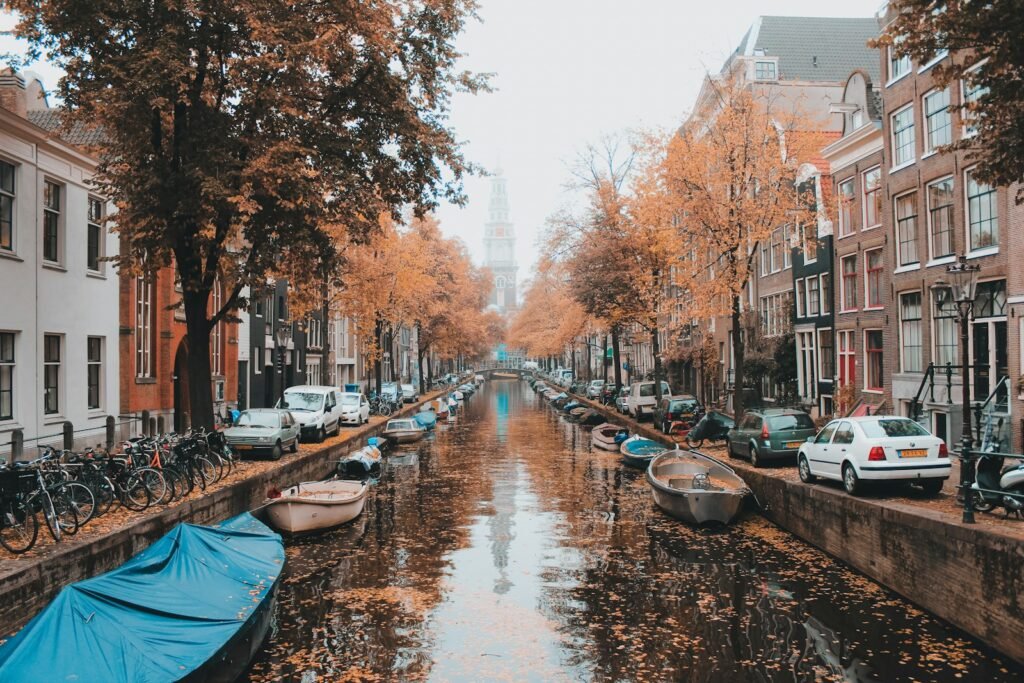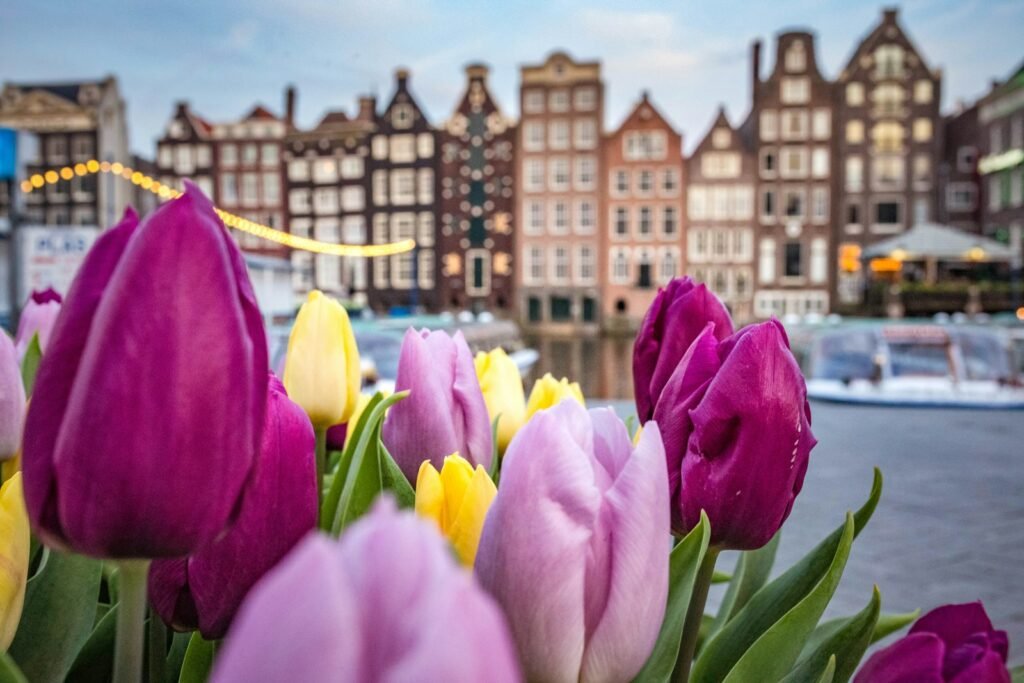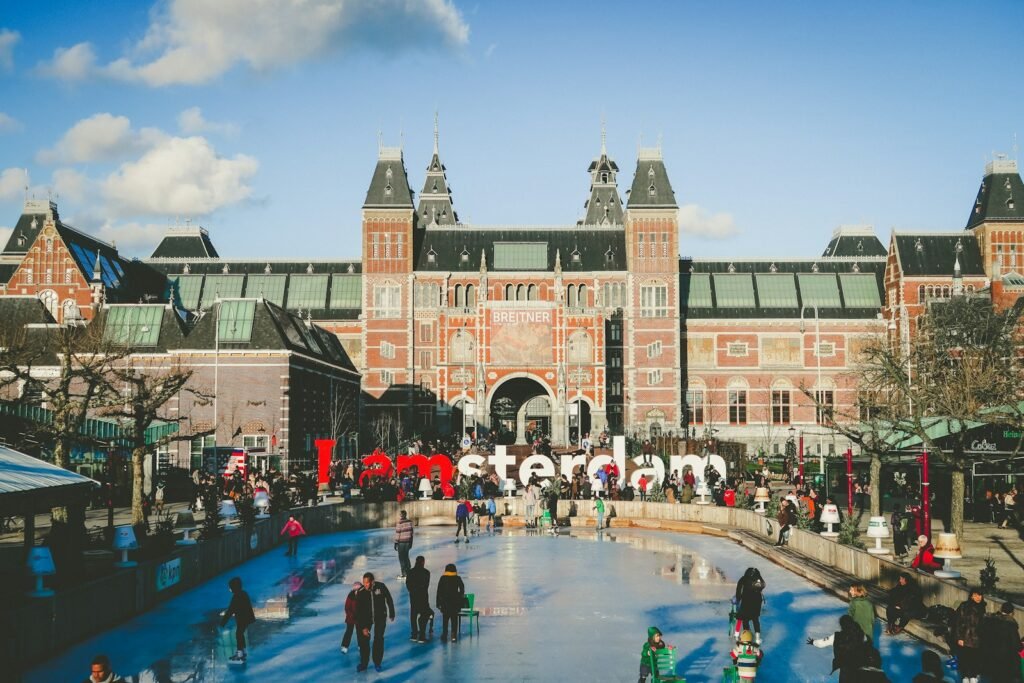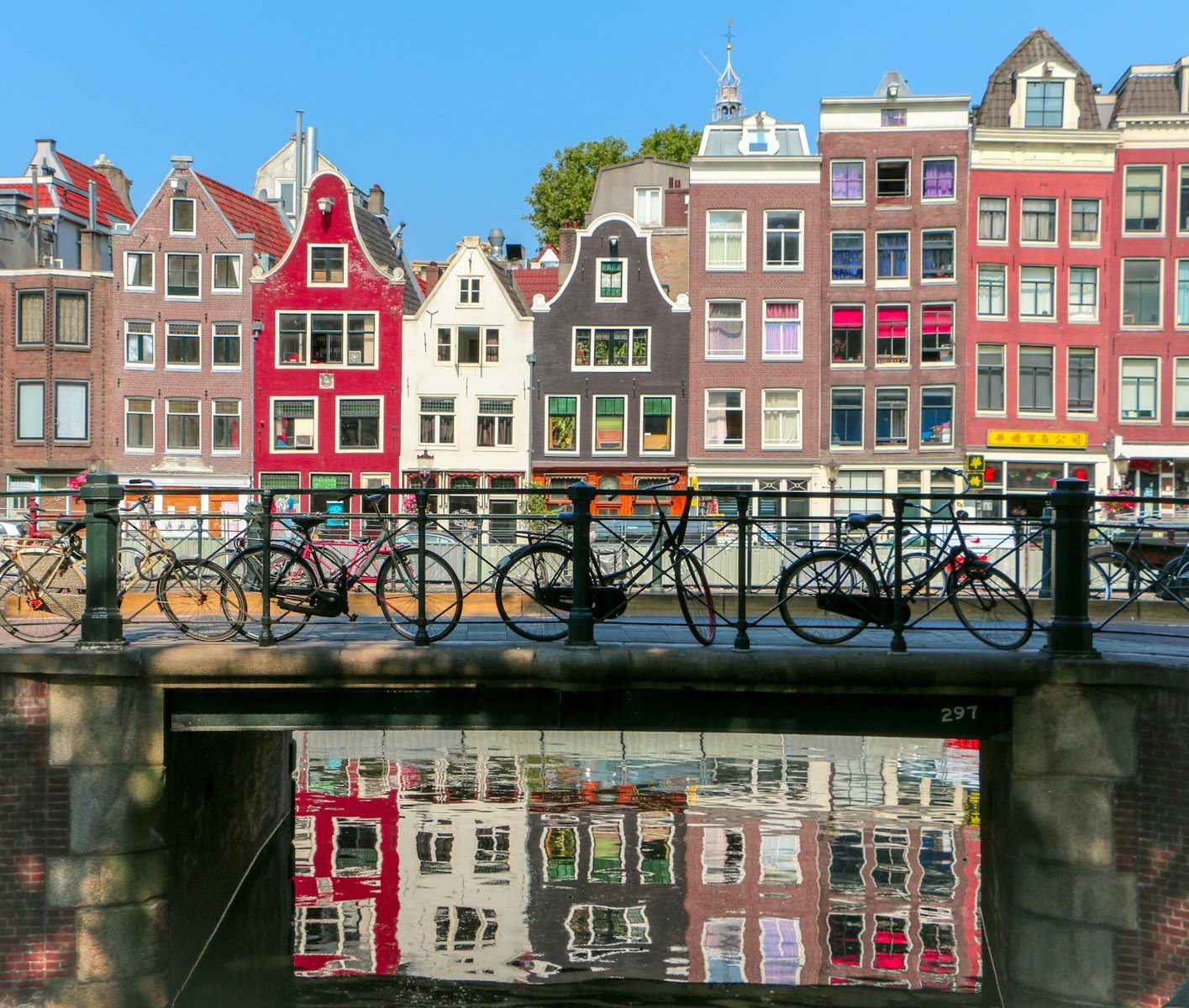Digital Nomad Visa Netherlands: How to Live and Work Remotely in 2025
The Netherlands is one of the best places for digital nomads—vibrant cities, excellent infrastructure, and a thriving remote work culture. But does the Netherlands offer a digital nomad visa? The short answer: not exactly. Unlike Portugal or Spain, the Netherlands doesn’t have a specific digital nomad visa, but there are several alternative pathways to legally live and work here. Let’s explore the best visa options, eligibility requirements, and how to make the Netherlands your next digital nomad base!
Is There a Digital Nomad Visa for the Netherlands?
The Netherlands does not currently offer a dedicated digital nomad visa, unlike some other European countries such as Portugal, Spain, or Estonia. This means that there isn’t a specific visa designed for remote workers who want to live in the Netherlands while working for a foreign company or running an online business. However, this doesn’t mean that digital nomads are out of options.
There are several alternative pathways that allow freelancers, entrepreneurs, and remote employees to legally reside in the Netherlands. These include:
- The Dutch Self-Employed Visa (ZZP Visa): This visa is ideal for freelancers and entrepreneurs who can demonstrate that their business will contribute to the Dutch economy. Applicants must meet a points-based system that assesses their experience, financial stability, and the viability of their business.
- The DAFT Visa (for US Citizens): Under the Dutch-American Friendship Treaty (DAFT), US citizens can start a business in the Netherlands with relatively straightforward requirements, including an initial bank deposit of €4,500.
- Long-Stay Residence Permits: Some non-EU citizens may qualify for long-term residency under specific conditions, such as being a highly skilled migrant or applying for a partner/spouse visa if they have a Dutch or EU citizen partner.
- The EU Blue Card: While not specific to digital nomads, the EU Blue Card allows skilled workers with a high salary (typically above €5,000/month) and an EU employer to live and work in the Netherlands.
- Schengen Visa (Short-Term Stay): Digital nomads who only plan to stay temporarily can enter the Netherlands on a Schengen visa, which allows non-EU citizens to remain in the country for up to 90 days within a 180-day period. However, this visa does not permit working for Dutch companies or establishing long-term residence.
Can Digital Nomads Work in the Netherlands Without a Visa?
For EU/EEA and Swiss citizens, there are no visa requirements—remote workers can move to the Netherlands freely and stay as long as they like. However, non-EU citizens must explore one of the visa options above if they plan to stay longer than the standard 90-day tourist visa allows.
While the Netherlands lacks a dedicated digital nomad visa, it remains a highly attractive destination for remote workers due to its strong digital infrastructure, excellent quality of life, and thriving international community. If you’re serious about making the Netherlands your base, choosing the right visa pathway is crucial for long-term success.

Best Visa Options for Digital Nomads in the Netherlands
While the Netherlands does not offer a dedicated digital nomad visa, several visa options allow remote workers, freelancers, and entrepreneurs to legally live and work in the country. Below are the most viable options:
1. Self-Employed Visa (ZZP Visa)
The ZZP visa is one of the most suitable options for freelancers, entrepreneurs, and remote workers who wish to legally operate their own business in the Netherlands. However, the application process is complex and highly selective, as applicants must prove that their business will benefit the Dutch economy.
Requirements:
- Meet a points-based system that evaluates professional experience, education, business plan, and economic contribution.
- Register a business with the Dutch Chamber of Commerce (KVK).
- Show financial sustainability, proving you can support yourself while living in the Netherlands.
Costs & Processing Time:
- Application Fee: €1,446 (as of 2024).
- Processing Time: Approximately 3 months.
Who is it Best For?
- Freelancers and self-employed individuals with a well-structured business plan.
- Digital entrepreneurs looking to establish a physical presence in the Netherlands.
- Remote workers who can convert their remote job into a freelance contract with their current employer.
2. DAFT Visa (For US Citizens Only)
US citizens can take advantage of the Dutch-American Friendship Treaty (DAFT), which provides an easier path to residency for entrepreneurs and freelancers. Compared to the ZZP visa, this option has lower requirements and does not use a points-based system.
Requirements:
- Register a business in the Netherlands.
- Deposit €4,500 in a Dutch bank account.
- The business must be active and operational (but no strict profitability requirements).
Benefits:
- Residency granted for two years, with the possibility of renewal.
- Fewer restrictions than the ZZP visa, making it a simpler option for US citizens.
Who is it Best For?
- Freelancers and entrepreneurs from the US looking for an easier way to live and work in the Netherlands.
- Digital nomads who want to set up a Dutch business with minimal bureaucracy.

3. Highly Skilled Migrant Visa (For Remote Employees)
If you are employed by a company that can sponsor a highly skilled migrant permit, this visa allows you to legally work and live in the Netherlands. While not designed for digital nomads, some remote workers may qualify if they meet the salary and employment requirements.
Requirements:
- Must have an employer that is a recognized sponsor in the Netherlands.
- Meet minimum salary requirements (as of 2024):
- €5,008 per month for most professionals (age 30+).
- €3,672 per month for younger professionals (under 30).
Who is it Best For?
- Remote workers who already work for an international company that is willing to sponsor their visa.
- High-income earners looking for a stable, long-term residency option.
4. Schengen Visa (Short-Term Stay for Digital Nomads)
For non-EU digital nomads who do not need a long-term visa, the Schengen Visa allows for a short stay in the Netherlands.
Key Limitations:
- You can stay for up to 90 days within a 180-day period.
- You cannot legally work for a Dutch company or operate a business based in the Netherlands.
- Not a long-term solution, but ideal for digital nomads traveling across Europe.
Who is it Best For?
- Digital nomads who move between Schengen countries and don’t need a long-term base.
- Remote workers who plan to stay in the Netherlands for a few months before relocating.
Requirements for Each Visa Option
If you’re considering moving to the Netherlands as a digital nomad, freelancer, or remote worker, understanding the requirements for each visa type is essential. Below is a detailed breakdown of what you need to qualify for each visa option.
1. Self-Employed Visa (ZZP Visa)
The ZZP visa is designed for freelancers and entrepreneurs who want to legally work in the Netherlands by starting their own business. However, this visa has strict requirements and operates under a points-based system that assesses your business’s potential benefit to the Dutch economy.
Key Requirements:
✔ Business Plan: You must submit a detailed business plan outlining your company’s activities, expected revenue, and how it will benefit the Dutch economy. The plan should include:
- A market analysis
- A financial forecast
- Evidence of potential clients or contracts
✔ Proof of Sufficient Income: You must prove that you can financially sustain yourself through your business. Generally, you need to show a minimum monthly income of at least €1,400–€1,500 to be considered self-sufficient.
✔ Registration with the Dutch Chamber of Commerce (KVK):
- Your business must be registered with Kamer van Koophandel (KVK) before applying for the visa.
- This is necessary for tax and legal purposes.
✔ Tax Registration: You must register with the Dutch Tax Authority (Belastingdienst) and obtain a VAT (BTW) number if applicable.
✔ Points-Based System: Your application will be assessed on a points-based system (out of 300 points). You need at least 90 points to qualify. Points are awarded based on:
- Your education and experience
- The innovation and economic value of your business
- Your financial investment in the Netherlands
✔ Application Fee: €1,446 (as of 2024).
✔ Processing Time: Around 3 months, but delays can occur.
Who is This Best For?
✅ Experienced freelancers and entrepreneurs with a strong business plan.
✅ Digital nomads who can convert remote work into a business.
✅ Those who can demonstrate their economic contribution to the Netherlands.

2. DAFT Visa (Dutch-American Friendship Treaty – For US Citizens Only)
The DAFT visa is a much simpler and more accessible visa option for US citizens who want to live and work in the Netherlands as entrepreneurs or freelancers. Unlike the ZZP visa, it does not require a points-based system or strict business evaluations.
Key Requirements:
✔ Open a Business in the Netherlands: You must register a sole proprietorship (eenmanszaak) or another business type with the Dutch Chamber of Commerce (KVK).
✔ Deposit €4,500 in a Dutch Bank Account:
- This serves as proof of financial commitment.
- The money must remain in the account and cannot be used for daily expenses.
✔ Prove Business Activity:
- While the DAFT visa has fewer restrictions than the ZZP visa, you still need to show that your business is actively operating.
- This means you should issue invoices, have clients, and generate some income.
✔ Residency Duration & Renewal:
- The DAFT visa grants two years of residency.
- It can be renewed as long as your business remains active.
✔ Application Fee: Approximately €350.
✔ Processing Time: Usually 1–2 months (faster than the ZZP visa).
Who is This Best For?
✅ US citizens who want a straightforward visa option.
✅ Freelancers and entrepreneurs who don’t meet the strict ZZP visa criteria.
✅ Digital nomads who want an easy, low-cost way to stay in the Netherlands.
3. Highly Skilled Migrant Visa (For Remote Employees with a Dutch-Sponsored Job)
The Highly Skilled Migrant Visa is designed for employees working for a Dutch company that is a recognized sponsor with the Dutch Immigration and Naturalization Service (IND). This visa is not ideal for freelancers or digital nomads, but remote employees who meet the salary requirements can qualify.
Key Requirements:
✔ Employer Sponsorship:
- Your employer must be registered as a recognized sponsor with the IND.
- The employer handles the visa application process on your behalf.
✔ Meet Minimum Salary Requirements (as of 2024):
- €5,008 per month before tax for workers aged 30 and older.
- €3,672 per month before tax for workers under 30.
- If applying as a recent graduate, the minimum is €2,801 per month.
✔ Employment Contract:
- You must sign an official contract with your Dutch employer.
- The company must prove that your role requires highly specialized skills.
✔ Health Insurance Requirement:
- You must obtain Dutch health insurance within 4 months of arrival.
✔ Residency Duration & Renewal:
- The visa is valid for the duration of your employment contract.
- If you switch jobs, your new employer must reapply for sponsorship.
✔ Application Fee:
- €350–€380 (usually paid by the employer).
✔ Processing Time:
- 2–4 weeks (one of the fastest visa processes).
Who is This Best For?
✅ Remote employees who work for an international company with a Dutch entity.
✅ Digital nomads who can be hired by a Dutch company as full-time employees.
✅ Tech professionals, engineers, and other highly skilled workers.
4. Schengen Visa (For Short-Term Stays – 90 Days Max)
For digital nomads who don’t need a long-term visa, the Schengen Visa allows non-EU citizens to stay in the Netherlands for up to 90 days within a 180-day period.
Key Requirements:
✔ Valid Passport: Must be valid for at least 3 months beyond your planned departure date.
✔ Proof of Sufficient Funds: Generally, around €55 per day of stay.
✔ Travel & Health Insurance: Must cover at least €30,000 in medical expenses.
✔ Return Ticket or Proof of Exit: You must show evidence of onward travel before your visa expires.
Who is This Best For?
✅ Digital nomads who travel frequently between Schengen countries.
✅ Remote workers who only need a temporary stay in the Netherlands.
✅ Those who don’t plan to establish a business or seek employment.

Cost of Living in the Netherlands for Digital Nomads
The Netherlands is a popular destination for digital nomads thanks to its high quality of life, fast internet, and strong international community. However, the cost of living can be quite high, especially in major cities like Amsterdam. Below is a detailed breakdown of typical expenses for digital nomads living in the Netherlands.
1. Rent & Accommodation Costs
Rent is one of the biggest expenses for digital nomads in the Netherlands, and prices vary significantly based on location. Amsterdam is the most expensive city, while places like Rotterdam, Utrecht, and The Hague offer more affordable options.
Average Monthly Rent Prices (2024 Estimates)
| Type of Accommodation | Amsterdam (€) | Rotterdam (€) | Utrecht (€) | The Hague (€) |
|---|---|---|---|---|
| Private Room (Shared Apartment) | 700–1,500 | 600–1,200 | 650–1,300 | 600–1,200 |
| Studio Apartment | 1,200–2,000 | 900–1,500 | 1,000–1,700 | 900–1,600 |
| 1-Bedroom Apartment | 1,500–2,500 | 1,100–2,000 | 1,200–2,200 | 1,100–2,000 |
| 2-Bedroom Apartment | 2,000–3,500 | 1,500–2,500 | 1,600–2,800 | 1,400–2,500 |
Additional Rental Costs:
✔ Utilities (electricity, water, heating): €150–€250 per month
✔ Internet: €40–€60 per month
✔ Municipal taxes (waste & water tax): €30–€60 per month
✔ Deposit Required: Usually 1–2 months’ rent upfront
💡 Tip: If you’re looking for more affordable housing, consider subletting or renting a private room instead of a full apartment. Websites like Kamernet, Funda, and HousingAnywhere are useful for finding rental options.
2. Coworking Spaces & Work-Friendly Cafés
While working from home is an option, many digital nomads in the Netherlands prefer coworking spaces or cafés with reliable Wi-Fi.
Coworking Space Costs (Per Month)
✔ Hot Desk: €150–€300
✔ Dedicated Desk: €250–€400
✔ Private Office: €500–€1,000
Popular Coworking Spaces in Major Cities:
📍 Amsterdam: TQ, WeWork, Spaces, The Social Hub
📍 Rotterdam: CIC Rotterdam, Spaces Hofplein, Het Industriegebouw
📍 Utrecht: Seats2meet, Tribes Utrecht, Mindspace
📍 The Hague: Apollo 14, The Hague Tech, Spaces Rode Olifant
💡 Tip: Some cafés in the Netherlands are digital nomad-friendly and allow you to work for long hours with good Wi-Fi. Popular choices include Bocca Coffee (Amsterdam), Hopper Coffee (Rotterdam), and 30ml Coffee (Utrecht).
3. Food & Grocery Costs
Food expenses in the Netherlands are moderate, but eating out frequently can be expensive.
Average Monthly Food Costs:
✔ Groceries (home cooking): €250–€450
✔ Eating Out (restaurants & cafés): €200–€500
✔ Coffee & Snacks: €50–€100
Average Meal Prices in Restaurants:
✔ Casual meal (lunch or dinner): €12–€20
✔ Three-course meal at a mid-range restaurant: €35–€60
✔ Fast food (McDonald’s, kebabs, etc.): €8–€12
✔ Coffee (cappuccino or latte): €3.50–€5
✔ Beer at a bar: €5–€7
💡 Tip: Supermarkets like Albert Heijn, Jumbo, and Lidl offer affordable groceries. Buying food at street markets (such as Albert Cuyp Market in Amsterdam) can also help cut costs.
4. Transportation Costs
The Netherlands has one of the best public transportation systems in Europe. While biking is the cheapest option, digital nomads can also use trains, trams, and buses to get around.
Public Transportation Costs:
✔ One-way tram/bus ticket: €3.20
✔ Monthly public transport pass: €90–€110
✔ OV-chipkaart (rechargeable travel card): €7.50 (one-time cost)
✔ Train ticket (Amsterdam to Rotterdam): ~€16 (one way)
Biking (Most Affordable Option):
✔ Used bike purchase: €100–€300
✔ Bike rental (Swapfiets subscription): €20–€25 per month
💡 Tip: If you plan to stay long-term, buying a used bike is the cheapest way to get around. The Netherlands is extremely bike-friendly, with dedicated cycling lanes and bike parking everywhere.

5. Health Insurance & Medical Costs
If you live in the Netherlands for more than 4 months, you are legally required to have Dutch health insurance (zorgverzekering).
Health Insurance Costs:
✔ Basic health insurance (mandatory): €120–€150 per month
✔ Doctor consultation: €50–€100 (without insurance)
✔ Emergency hospital visit: €300+ (without insurance)
💡 Tip: If you are a short-term digital nomad, international health insurance from providers like SafetyWing, Cigna, or World Nomads is a more flexible option.
6. Entertainment & Lifestyle Costs
The Netherlands offers a great work-life balance, with plenty of options for socializing, sightseeing, and entertainment.
Monthly Leisure Costs:
✔ Gym membership: €30–€70
✔ Cinema ticket: €12–€15
✔ Museum entrance: €10–€20
✔ Nightclub entry fee: €10–€20
✔ Weekend trips (Belgium, France, Germany): €50–€200 (transport & accommodation)
💡 Tip: A Museumkaart (€75 per year) grants unlimited access to over 400 museums across the Netherlands, making it a great investment if you love culture and history.
7. Total Estimated Cost of Living for Digital Nomads
| Expense Category | Estimated Monthly Cost (€) |
|---|---|
| Rent & Utilities | €1,200–€2,500 |
| Coworking Space | €150–€400 |
| Food (groceries + eating out) | €500–€1,000 |
| Transportation | €50–€150 |
| Health Insurance | €120–€150 |
| Entertainment & Leisure | €200–€500 |
| Total Monthly Cost | €2,200–€4,700 |
💡 Note: Your cost of living depends on your lifestyle, location, and spending habits. Living outside of Amsterdam or choosing a coliving space can significantly reduce costs.
Best Cities for Digital Nomads in the Netherlands
1. Amsterdam (Most Popular & Expensive)
✔ Best for networking, coworking spaces, and international culture
✔ Highest cost of living (€2,500–€4,700 per month)
✔ Vibrant nightlife, events, and startup scene
2. Rotterdam (More Affordable & Modern)
✔ Lower cost of living (€2,000–€3,800 per month)
✔ Modern city with excellent transport and coworking spaces
✔ Less touristy, more local vibe
3. Utrecht (Cozy & Student-Friendly)
✔ Charming canals, historic city center
✔ Smaller but has great coworking spaces
✔ Lower rent (€1,800–€3,500 per month)
4. The Hague (Relaxed & Political Hub)
✔ Ideal for diplomats, entrepreneurs, and remote workers
✔ Close to the beach (Scheveningen)
✔ More affordable rent than Amsterdam (€1,800–€3,500 per month)
Taxes for Digital Nomads in the Netherlands
If you’re a digital nomad planning to live and work in the Netherlands, understanding the tax system is crucial. The Dutch tax system is known for being progressive, business-friendly, and highly structured, but it can be complex, especially for freelancers and remote workers. This guide will help break down the key tax obligations, income tax rates, registration requirements, and ways to avoid double taxation as a digital nomad.
1. Do Digital Nomads Need to Pay Taxes in the Netherlands?
Whether you need to pay taxes in the Netherlands depends on your residency status and income source:
✔ If you stay in the Netherlands for more than 183 days per year, you are considered a tax resident and must pay taxes on your worldwide income.
✔ If you stay for less than 183 days, you are a non-resident taxpayer and are only taxed on income earned within the Netherlands (e.g., income from Dutch clients or a Dutch-registered business).
✔ If you work remotely for a foreign company or clients outside the Netherlands, you may not be required to pay Dutch income tax, depending on your home country’s tax treaties.
💡 Tip: Even if you are not required to pay taxes in the Netherlands, you might still need to file a tax return if you receive income from Dutch sources.
2. How to Register for Taxes as a Freelancer (ZZP) in the Netherlands
If you are a freelancer, self-employed worker, or contractor, you must register with the Dutch Tax Authority (Belastingdienst) to operate legally. Here’s how:
Step 1: Register with the Chamber of Commerce (KvK)
✔ Apply for a KvK (Kamer van Koophandel) number through the official website: www.kvk.nl.
✔ Choose your business structure (most digital nomads register as ZZP – Zelfstandige Zonder Personeel, meaning a sole proprietor).
✔ Registration costs €75 (one-time fee).
Step 2: Get a Dutch Tax Number (BTW Number)
✔ After registering with KvK, you will receive a BTW-nummer (VAT number) from the Belastingdienst.
✔ This is required if you provide services or goods subject to VAT.
Step 3: File Your Taxes (Quarterly & Annually)
✔ Quarterly VAT Returns: If your business is VAT-registered, you must file BTW (VAT) returns every three months.
✔ Annual Income Tax Return: As a freelancer, you must file your personal income tax return (inkomstenbelasting) by May 1st of each year.
💡 Tip: You may qualify for the Small Business Scheme (KOR), which allows you to be exempt from VAT if your revenue is below €20,000 per year.
3. Income Tax Rates in the Netherlands
The Netherlands has a progressive income tax system, meaning the more you earn, the higher your tax rate.
2024 Dutch Income Tax Brackets
| Annual Income (€) | Tax Rate (%) |
|---|---|
| Up to €73,031 | 36.97% |
| Above €73,031 | 49.50% |
💡 Example Calculation:
✔ If you earn €50,000 per year, your tax rate is 36.97%, meaning you pay ~€18,485 in taxes.
✔ If you earn €90,000 per year, the first €73,031 is taxed at 36.97%, and the remaining €16,969 is taxed at 49.50%.
4. VAT (BTW) for Digital Nomads
The Dutch VAT (BTW – Belasting Toegevoegde Waarde) system applies to most businesses, including freelancers.
✔ The standard VAT rate is 21% (applicable to most services and goods).
✔ The reduced VAT rate of 9% applies to essential services like food, books, and medicines.
✔ Some services are VAT-exempt, such as education, financial services, and healthcare.
How Does VAT Work for Digital Nomads?
✔ If you sell services to clients within the Netherlands, you must charge 21% VAT and report it to the tax office.
✔ If you work with EU clients, you may need to use reverse charge VAT (shifting the VAT responsibility to the client).
✔ If you provide services to non-EU clients, your invoices are often zero-rated (0% VAT).
💡 Tip: Many freelancers use accounting tools like Moneybird, Exact, or e-Boekhouden to handle VAT calculations and tax filing automatically.
5. Avoiding Double Taxation as a Digital Nomad
One of the biggest concerns for digital nomads is double taxation, meaning paying taxes in both your home country and the Netherlands.
How to Avoid Double Taxation?
✔ Check for Tax Treaties: The Netherlands has tax treaties with over 100 countries to prevent double taxation.
✔ Use the 183-Day Rule: If you stay in the Netherlands for less than 183 days in a year, you may not owe Dutch income tax.
✔ Apply for Foreign Tax Credits: If you pay tax in one country, you might get a tax credit in your home country.

Countries That Have Tax Treaties with the Netherlands
✔ United States
✔ Canada
✔ United Kingdom
✔ Australia
✔ Most EU countries
💡 Tip: If you are from the US, you may still need to file a US tax return due to citizenship-based taxation, even if you live in the Netherlands.
6. Social Security & Healthcare Taxes
If you live in the Netherlands and pay taxes, you may also need to contribute to social security.
✔ Health Insurance: Dutch residents must pay for private health insurance (€120–€150 per month).
✔ Social Security Contributions: If you are considered a Dutch resident, you may have to contribute to pension funds and national insurance schemes.
💡 Tip: Some digital nomads choose international health insurance (like SafetyWing or Cigna) instead of Dutch health insurance.
7. Summary of Key Tax Points for Digital Nomads
| Tax Obligation | Details |
|---|---|
| Residency Rule | If you stay over 183 days per year, you are a tax resident. |
| Income Tax | 36.97% for income up to €73,031; 49.50% for income above that. |
| VAT (BTW) Rate | 21% standard rate, 9% for essentials, 0% for some international services. |
| Tax Registration | Freelancers must register with KvK & Belastingdienst. |
| Quarterly Tax Filing | VAT (if applicable) must be filed every 3 months. |
| Double Taxation | Tax treaties help avoid double taxation for non-EU nationals. |
| Social Security | Mandatory health insurance & pension contributions for Dutch residents. |
How to Apply for a Visa as a Digital Nomad in the Netherlands
The Netherlands is an attractive destination for digital nomads due to its high quality of life, excellent infrastructure, and strong expat community. However, unlike some countries, the Netherlands does not currently offer a dedicated digital nomad visa. Instead, digital nomads must apply for a visa that aligns with their employment status, business activities, or highly skilled work.
This guide provides a step-by-step breakdown of how to apply for a visa as a digital nomad in the Netherlands, including visa options, required documents, and the registration process after arrival.
1. Choose the Right Visa Based on Your Situation
Since the Netherlands does not have a specific digital nomad visa, freelancers, entrepreneurs, and remote workers typically apply for one of the following:
A) Self-Employment Visa (ZZP Visa – Zelfstandige Zonder Personeel)
✔ Ideal for freelancers, entrepreneurs, and business owners.
✔ Requires proof of financial stability and a viable business plan.
✔ Must register as a business with the Chamber of Commerce (KvK).
✔ Valid for up to two years, renewable.
B) Dutch-American Friendship Treaty (DAFT) Visa (For U.S. Citizens Only)
✔ Available only for U.S. entrepreneurs.
✔ Requires a minimum investment of €4,500 in a Dutch business bank account.
✔ Must register a business with the Chamber of Commerce (KvK).
✔ Easier to obtain compared to other visa types.
C) Highly Skilled Migrant Visa (Employer-Sponsored)
✔ For remote workers with an employment contract from a Dutch company.
✔ Employer must be a recognized sponsor by the IND (Dutch Immigration Service).
✔ Minimum salary requirements:
- €3,672 per month (under 30 years old).
- €5,008 per month (30+ years old).
D) Startup Visa (For Entrepreneurs with Innovative Business Ideas)
✔ Best for tech startups and innovative businesses.
✔ Requires a business mentor from an approved Dutch startup accelerator.
✔ Valid for one year, with an option to transition into a ZZP Visa.
💡 Tip: If you are an EU/EEA or Swiss citizen, you do not need a visa and can work freely in the Netherlands.
2. Prepare Required Documents for Your Visa Application
Before applying for a visa, you must prepare the following documents:
✔ Valid Passport – Must be valid for at least 6 months beyond your intended stay.
✔ Business Plan (for ZZP and DAFT Visa) – Must include market research, expected income, and growth potential.
✔ Financial Proof – Show sufficient funds to support yourself (minimum €1,350/month).
✔ Health Insurance – Required for all long-term stays.
✔ Dutch Address Registration – Needed for your residence permit.
✔ Employment Contract (if applicable) – Required for the Highly Skilled Migrant Visa.
✔ KvK Business Registration – Required for freelancers and entrepreneurs.
✔ Proof of Investment (for DAFT Visa) – Show a €4,500 business bank deposit.
💡 Tip: The Dutch government prefers applications with strong business plans and clear financial stability. Having a Dutch accountant or business consultant review your application can increase your chances of approval.
3. Submit Your Application to the IND (Dutch Immigration Service)
Once you have gathered all required documents, submit your visa application to the Immigration and Naturalization Service (IND).
✔ Where to Apply?
- Online via the IND website.
- At a Dutch embassy or consulate in your home country.
- Through a recognized sponsor (if employer-sponsored).
✔ Visa Fees (as of 2024)
- Self-Employment Visa (ZZP Visa): €1,446
- DAFT Visa (U.S. Citizens): €421
- Highly Skilled Migrant Visa: €350–€400 (usually paid by the employer)
- Startup Visa: €350
✔ Processing Time
- ZZP Visa: 90–120 days
- DAFT Visa: 4–8 weeks
- Highly Skilled Migrant Visa: 2–4 weeks
- Startup Visa: 90 days
💡 Tip: If you plan to stay in the Netherlands while waiting for your visa approval, apply for a temporary residence permit (MVV) at the same time.
4. Wait for Approval & Collect Your Residence Permit
✔ Once your visa is approved, you will receive an official letter from the IND.
✔ You must collect your residence permit from an IND office within 2 weeks of arriving in the Netherlands.
✔ Your residence permit allows you to live and work in the Netherlands legally.
💡 Tip: Keep a copy of your visa application receipt in case you need proof of your pending status while waiting for approval.
5. Register in the Netherlands (BSN Number & Bank Account)
After arriving in the Netherlands, complete the following steps to legally work and live as a digital nomad:
A) Register at the Municipality (Gemeente) & Get a BSN Number
✔ Within 5 days of arrival, register at your local municipality office (Gemeente).
✔ You will receive a BSN (Burgerservicenummer), which is required for banking, taxes, and healthcare.
✔ Bring your passport, rental contract, and visa approval letter.
B) Open a Dutch Bank Account
✔ Most visa types (ZZP, DAFT) require a Dutch business bank account.
✔ Popular banks for digital nomads: Bunq, ING, ABN AMRO, and Rabobank.
✔ Some banks require a Dutch address and BSN number before opening an account.
C) Get Health Insurance
✔ Dutch law requires all residents to have health insurance.
✔ Basic coverage costs €120–€150 per month.
✔ You can also use international expat insurance (e.g., SafetyWing, Cigna).
💡 Tip: Some banks, like Bunq, allow you to open an account without a BSN number, making it easier for newcomers.
6. Summary of the Visa Application Process
| Step | Details |
|---|---|
| Choose Visa Type | ZZP (Freelancer), DAFT (U.S. Entrepreneurs), Highly Skilled Migrant (Employer-Sponsored), or Startup Visa. |
| Prepare Documents | Passport, business plan, proof of income, health insurance, KvK registration (if required). |
| Submit Application | Apply online or at a Dutch embassy. |
| Pay Fees | €350–€1,446, depending on the visa type. |
| Wait for Processing | 2 weeks (Highly Skilled Migrant) to 3 months (ZZP). |
| Register in NL | Get a BSN number, open a bank account, and obtain health insurance. |
Pros and Cons of Being a Digital Nomad in the Netherlands
1. High-Quality Infrastructure and Internet
The Netherlands is known for its world-class infrastructure, making it easy to live and work remotely. Key benefits include:
✔ Fast and reliable internet – Average speeds of 150+ Mbps, even in smaller cities.
✔ Efficient public transport – Trains, trams, and buses connect cities with minimal delays.
✔ Well-maintained roads and bike lanes – The Netherlands is one of the most bike-friendly countries in the world.
💡 Tip: If you work remotely, consider using fiber-optic internet providers like KPN, Ziggo, or T-Mobile Home for ultra-fast speeds.
2. Strong International Community & Networking Opportunities
The Netherlands, especially cities like Amsterdam, Rotterdam, and The Hague, has a thriving expat and entrepreneur scene. Benefits include:
✔ Large English-speaking community (90% of Dutch people speak English fluently).
✔ Co-working spaces and tech hubs – Ideal for networking and collaborating.
✔ Frequent start-up events, workshops, and meetups.
💡 Best Networking Spots for Digital Nomads:
✔ TQ Amsterdam – Co-working and startup community.
✔ The Student Hotel (TSH) Workspaces – Popular for freelancers.
✔ Rotterdam Venture Café – Great for business networking.
3. Safe, Bike-Friendly Cities
The Netherlands is one of the safest countries in the world, making it an ideal place for digital nomads. Key benefits:
✔ Low crime rates and a strong sense of public safety.
✔ Bike-friendly cities with dedicated lanes and traffic signals.
✔ Excellent work-life balance, with a focus on health and well-being.
💡 Tip: Get a Dutch OV-chipkaart for easy access to public transport, or rent a bike using Swapfiets for a low monthly fee.
4. Easy Travel Within Europe
The Netherlands is centrally located in Europe, making it perfect for weekend trips to other countries. Benefits include:
✔ Direct trains to Paris, Berlin, and Brussels.
✔ Schiphol Airport is one of Europe’s busiest, with flights to 300+ destinations.
✔ Affordable travel options with FlixBus and budget airlines like Ryanair and EasyJet.
💡 Tip: If you travel frequently, get a Eurail Pass for unlimited train travel across Europe.
5. Progressive Culture & High Quality of Life
✔ Work-life balance – Dutch culture values personal time and relaxation.
✔ Diversity & inclusivity – The Netherlands is one of the most LGBTQ+ friendly countries.
✔ Sustainability focus – Many cities aim to be carbon neutral by 2030.
💡 Tip: If you enjoy sustainable living, check out Utrecht, which has the world’s largest bike parking facility and green rooftops.
❌ Cons of Being a Digital Nomad in the Netherlands
1. High Cost of Living
The Netherlands, particularly Amsterdam, is one of the most expensive places for digital nomads.
| Expense | Cost per Month (€) |
|---|---|
| Rent (1-bedroom in Amsterdam) | €1,800 – €2,500 |
| Rent (Rotterdam, Utrecht, The Hague) | €1,200 – €2,000 |
| Coworking Space | €150 – €400 |
| Food & Groceries | €500 – €800 |
| Public Transport | €80 – €100 |
| Health Insurance | €120 – €150 |
💡 Tip: Save money by living in smaller cities like Haarlem, Groningen, or Eindhoven, where rent is 30–40% cheaper than in Amsterdam.
2. No Official Digital Nomad Visa (Yet)
Unlike countries like Portugal, Spain, or Estonia, the Netherlands does not have a dedicated digital nomad visa. Instead, remote workers must apply for a:
❌ Freelancer Visa (ZZP Visa) – Complex process with strict financial requirements.
❌ DAFT Visa – Only available to U.S. citizens starting a business.
❌ Highly Skilled Migrant Visa – Requires sponsorship from a Dutch company.
💡 Tip: If you want an easier visa process, consider neighboring countries like Portugal (D7 Visa) or Spain (Digital Nomad Visa).
3. Complex Tax System
The Dutch tax system is not friendly to freelancers and remote workers, with high taxes and complex rules:
❌ Progressive income tax – Ranges from 9.42% to 49.5%.
❌ Mandatory VAT registration – Freelancers earning over €20,000 per year must charge 21% VAT.
❌ Tax treaties are needed to avoid double taxation for non-EU nationals.
💡 Tip: Work with a Dutch accountant or use services like TaxDirect to avoid legal issues.
4. Rainy & Windy Weather
The Netherlands is known for its unpredictable weather, with frequent rain and strong winds.
❌ Winters can be gray, cold, and rainy.
❌ Summers are mild but can be unpredictable (sunny one day, rainy the next).
💡 Tip: Always carry a raincoat and waterproof backpack, and check Buienradar for live rain updates.
5. Overcrowding in Major Cities
Cities like Amsterdam and Utrecht suffer from:
❌ Housing shortages, making it hard to find affordable rent.
❌ Over-tourism, especially in summer.
❌ High cost of daily expenses due to inflation and demand.
💡 Tip: Consider living in less crowded cities like Leiden, Eindhoven, or Groningen, which offer a high quality of life with fewer tourists.
Final Verdict: Is the Netherlands Good for Digital Nomads?
The Netherlands is a fantastic place for digital nomads who value safety, excellent infrastructure, and strong networking opportunities. However, it comes with challenges, such as high living costs, complex taxes, and no official digital nomad visa.
| Category | Rating (⭐ out of 5) |
|---|---|
| Internet Speed | ⭐⭐⭐⭐⭐ (Fast & reliable) |
| Safety | ⭐⭐⭐⭐⭐ (Very safe) |
| Cost of Living | ⭐⭐⭐ (Expensive, especially in Amsterdam) |
| Visa Options | ⭐⭐ (No digital nomad visa yet) |
| Weather | ⭐⭐⭐ (Rainy & windy, but mild winters) |
| Work-Life Balance | ⭐⭐⭐⭐⭐ (Excellent) |
| Networking & Community | ⭐⭐⭐⭐⭐ (Many international expats & entrepreneurs) |
Who is the Netherlands Best For?
✅ Freelancers & entrepreneurs who can secure a ZZP or DAFT Visa.
✅ Tech professionals & remote workers with a Dutch employer sponsorship.
✅ Expats who prioritize infrastructure, safety, and networking.
Who Might Struggle in the Netherlands?
❌ Budget travelers – High rent & daily expenses make it costly.
❌ Freelancers without a strong business plan – The ZZP Visa requires proof of income & financial stability.
❌ People who dislike rainy weather – Expect frequent gray skies and strong winds.

Conclusion:
While the Netherlands doesn’t have a digital nomad visa, there are still viable pathways for remote workers and freelancers. Whether through the ZZP visa, DAFT visa, or short-term stays, the Netherlands remains an excellent destination for digital nomads seeking a dynamic and well-connected base. Ready to start your journey? Explore visa options and take the next step toward living in the Netherlands!
Looking for alternatives? Maybe you should check out my post about the frence Digital Nomad Visa Everything You Need to Know About France’s Digital Nomad Visa in 2025






